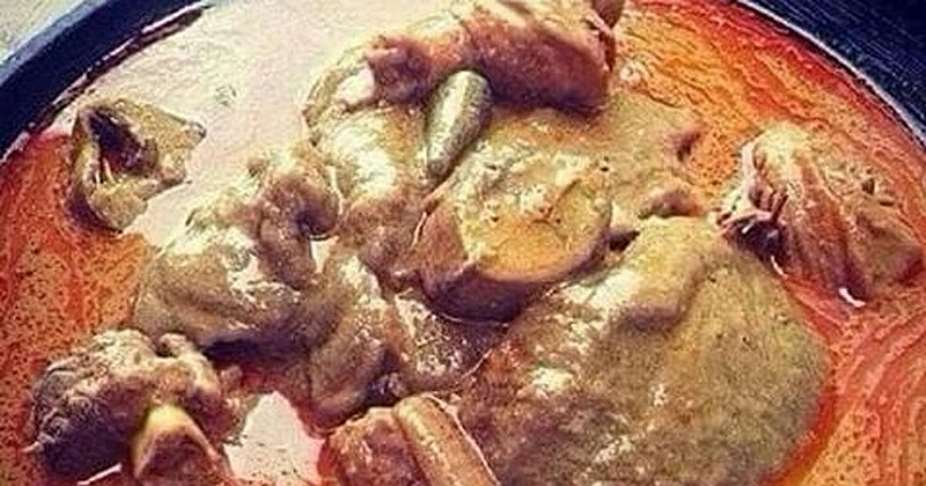Kokonte, also known as 'Face the wall,' 'Lapiwa,' 'Abetie,' 'Gigi,' 'amferewase' is a staple food eaten in many parts of Ghana and other West African countries, including Togo.
It is a delicacy for ethnic groups like the Ga-adagmes, Akans, Ewes and Hausas.
Although highly nutritious, it is perceived to be for the poor, with many hiding to enjoy it for, which reason it is called 'Face the wall.'
Recently, kokonte, known as abetie in the Akan Language, has gained so much popularity and respect due to its nutritional value, with many, the young and the old, enjoying it with groundnut soup, palm nut soup, and grinded pepper.
Kokonte is made of dried cassava flour. The method of preparation is like that of banku and Tuo Zaafi, but has a unique brown colour, which differentiates it from banku, fufu, akple or tuo zaafi.
Kokonte is mostly taken as lunch or dinner and served with groundnut soup, okro stew or soup, light soup, palm nut soup and grinded pepper.
Mrs Sharon Larbie, Senior Registered Dietician at the Trust Hospital Limited, says kokonte is highly recommended due to the nutrition in cassava, mainly carbohydrates, which provides energy to the body.
She says: ” We need energy to go about our daily activities and regulate our body temperature and other body functions. There are other nutrients such as vitamins and minerals. The yellowish cassava has vitamin A, a bit of magnesium, zinc, and all the micronutrients,” and that when plantain is added, kokonte gets richer with potassium.
Mrs Larbie says when enjoyed with groundnut soup and vegetables, the meal becomes well balanced.
“Groundnuts are rich protein and have a bit of carbohydrates, minerals and vitamins B6, perineum magnesium zinc and folic, which are all needed in proper functioning of the body,” she adds.
Minerals and vitamins derived from vegetables are also important in preventing diseases whiles the antioxidants help in preventing cancers.
The Dietician says the fish in the meal also has omega 3 and 6 as well as fats -all good for lubrication of the joints and prevents heart diseases.
Mr Benjamin Mensah, a Writer and lover of 'Face the wall' says the meal has now become part of his family’s menu saying, ” growing up, we did not eat kokonte at home because my mother was not preparing it for us. I started eating kokonte with curiosity in JHS three when I followed my mates to a joint to try it and I enjoyed it so much with groundnut soup and it has become part of my family’s meal.”
Mr. James Kwashie, self-employed, says: ” I love it, it is quick and easy to prepare.”
As we mark this year's Ghana Month, the citizens are, therefore, encouraged to patronise local dishes, including kokonte, which experts confirm are organic with rich nutrients.
GNA





 Saglemi Housing Project will not be left to rot – Kojo Oppong Nkrumah
Saglemi Housing Project will not be left to rot – Kojo Oppong Nkrumah
 Transport fares hike: GPRTU issue two-day ultimatum
Transport fares hike: GPRTU issue two-day ultimatum
 ARC endorses Alan as presidential candidate – Buaben Asamoa
ARC endorses Alan as presidential candidate – Buaben Asamoa
 Akufo-Addo appoints Kwasi Agyei as new Controller and Accountant-General
Akufo-Addo appoints Kwasi Agyei as new Controller and Accountant-General
 PNC dismiss reports of mass resignations
PNC dismiss reports of mass resignations
 PAC advocates for revenue collectors to be engaged on commission basis, not full...
PAC advocates for revenue collectors to be engaged on commission basis, not full...
 Genser Energy commissions 110km of natural gas pipeline at Anwomaso
Genser Energy commissions 110km of natural gas pipeline at Anwomaso
 Naa Torshie calls for tolerance, peace ahead of 2024 election
Naa Torshie calls for tolerance, peace ahead of 2024 election
 Asantehene commends Matthew Opoku Prempeh for conceiving GENSER Kumasi Pipeline ...
Asantehene commends Matthew Opoku Prempeh for conceiving GENSER Kumasi Pipeline ...
 Let’s do away with ‘slash and burn politics’ in Ghana — Dr Adutwum
Let’s do away with ‘slash and burn politics’ in Ghana — Dr Adutwum
